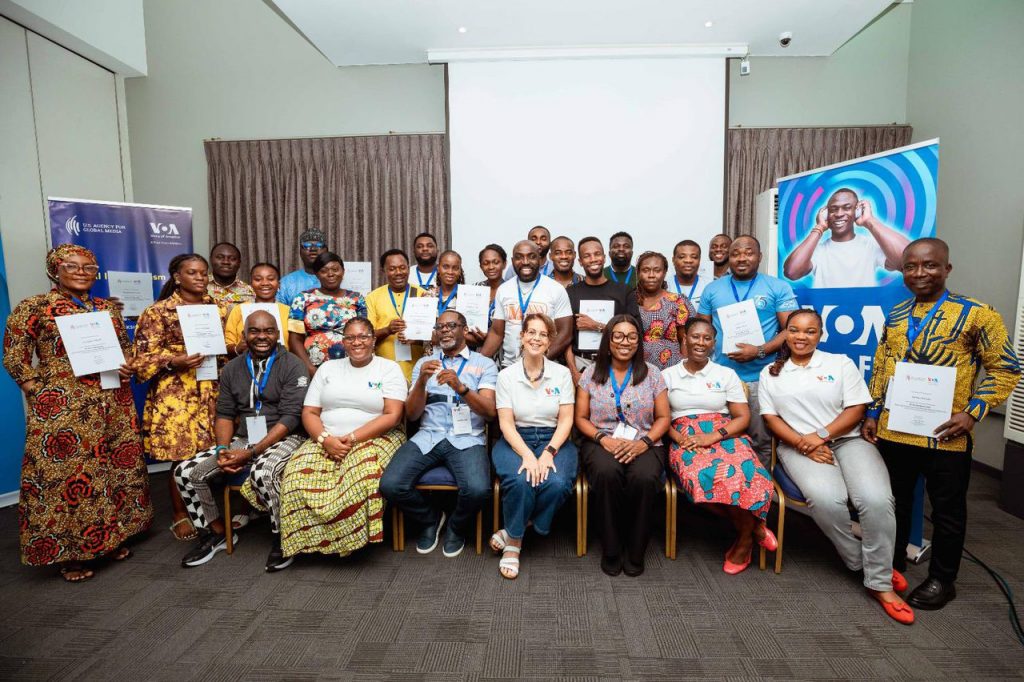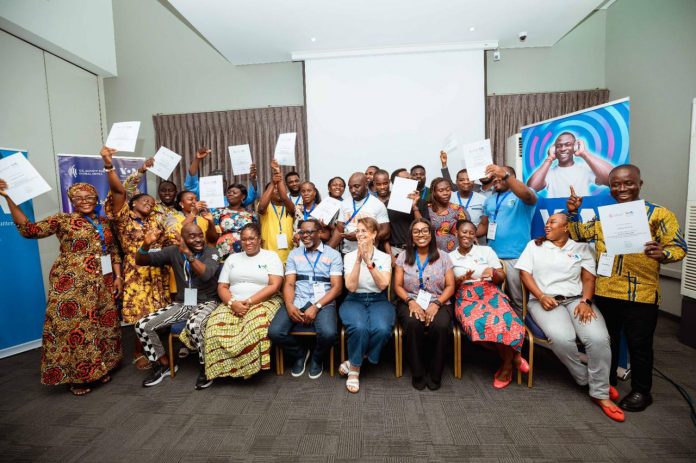Accra witnessed a transformative three-day training session on Artificial Intelligence (AI) for journalists, where Mr. Celestine Achi, Chief AI and Information Management Officer at Cihan Media Group, called on media professionals to embrace AI as a critical tool for innovation in the fast-changing media landscape. Addressing 25 participants drawn from the Central, Western, and Greater Accra Regions, Mr. Achi emphasized that AI is no longer a futuristic concept but a present-day necessity.
“AI is no longer the future; it is the present,” Mr. Achi declared during his keynote address. He stressed the profound potential of AI tools in transforming journalism by automating fact-checking, transcription, data analysis, and audience engagement. According to him, journalists must not view AI as a mere aid but as a catalyst that can redefine accuracy, efficiency, and creativity in news production.
The training, held in collaboration with the U.S. Agency for Global Media (USAGM) and Voice of America (VOA), was accredited by the Institute of Information Management Africa. It aimed to equip journalists and editors with cutting-edge AI knowledge and skills for modern media operations. Sessions covered key topics such as AI fundamentals, machine learning applications across print, online, and broadcast media, ethics in AI use, prompt engineering, and AI-driven news gathering and reporting.
The Transformative Role of AI in Journalism
Speaking on the evolving media landscape, Mr. Achi highlighted how AI has fundamentally altered communication and content creation. “The world of communications isn’t about tomorrow—it’s about right now. AI tools are no longer an option; they’re essential,” he stated. He emphasized that the media industry is already experiencing the disruptive power of AI, from crafting precise messages to reaching global audiences effectively.
Mr. Achi also explored the growing impact of generative AI, which he described as the next frontier in journalism and other industries. While traditional AI methods remain important for automation, predictive analytics, and data-driven decision-making, he noted that combining generative and prescriptive AI could unlock even greater possibilities. Prescriptive AI, he explained, goes beyond forecasting to suggest the best possible actions based on specific goals.
To maximize these tools, Mr. Achi encouraged journalists to hone their English language skills, master the art of crafting scenarios for AI prompts, and integrate AI into newsroom workflows. He further urged media organizations to invest in continuous AI training to ensure their teams remain ahead of the curve. “Journalists who fail to embrace AI risk being left behind, while those who adapt will lead the next wave of media innovation,” he warned.

Global Collaboration and Local Impact
The event also featured insights from key stakeholders in AI and media. Paula Caffey, Co-Regional Marketing Manager for West and Central Africa, spoke on the importance of policy and ethical considerations in AI adoption. “AI is not going away, and many media organizations are cautious about its use. That’s why this training is crucial—to ensure journalists can use AI responsibly and efficiently,” she said.
Mathew Asada, Press Attaché at the U.S. Embassy in Ghana, echoed this sentiment, highlighting the range of training opportunities designed to equip journalists with skills for the digital age. He encouraged Ghanaian media practitioners to leverage such initiatives to remain competitive globally, emphasizing that technological literacy is key to thriving in the rapidly evolving media environment.
Participants Share AI Insights
For participants, the training was both enlightening and empowering. Mr. Michael Asharley, a journalist from Multimedia Group, expressed enthusiasm about the practical applications of AI in his work. “The training was an eye-opener—it showed how AI can cut out mundane, repetitive tasks like transcribing interviews and open doors to more creative, impactful storytelling,” he shared. Asharley added that the practical sessions provided hands-on experience with AI tools, making the possibilities feel both exciting and achievable.
The training program concluded with participants gaining valuable insights into the transformative role of AI in journalism. With the knowledge and skills acquired, these journalists are now better prepared to harness AI as a tool for innovation, efficiency, and global competitiveness in the media industry. As the media landscape continues to evolve, such initiatives highlight the critical need for journalists to remain adaptable, forward-thinking, and ready to embrace new technologies.
Story by: Esi Kwentsiwaa Acquah



